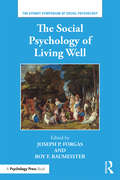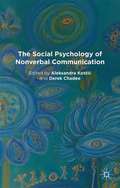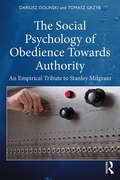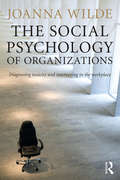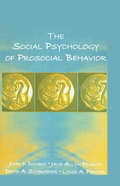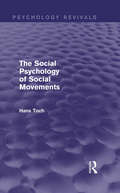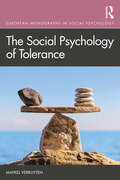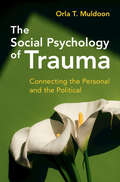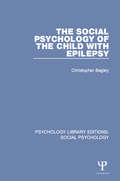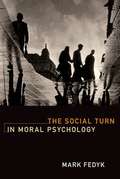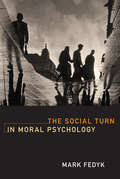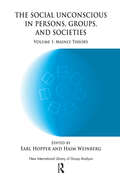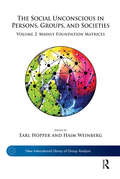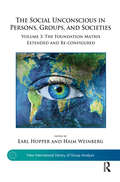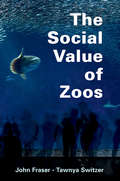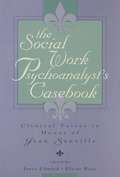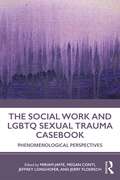- Table View
- List View
The Social Psychology of Intractable Conflicts
by Eran Halperin Keren SharvitThis volume works explores a transferable theory of a specific social-psychological infrastructure, based on the work of Dr. Daniel Bar-Tal, that develops from cultures immersed in intractable conflicts. The book's approach to this issue is different from approaches that are predominant in social psychology. This is because an important inspiration of many scholars that contributed to the book is their everyday experience of living in a region where intractable conflict shapes the life's of everybody who lives there. On the basis of this experience and on the basis of extensive research, an elaborate theory of intractable conflict was developed that deals with the origin of such conflicts, the mechanisms that maintain them and the processes that may contribute to their peaceful solution. In light of recent research and developments, this volume demonstrates, analyzes and reviews the theory of a social-psychological infrastructure formed in societies with intractable conflicts. It explores the contents of these elements of the infrastructure, the processes through which they are acquired and maintained, their functions, the societal mechanisms that contribute to their institutionalization, as well as their role in the crystallization of social identity and development of a culture of conflict. By demonstrating that it can be applied to various kinds of intractable conflicts in various places of world, the volume argues that the theory is transferable and universal. Moreover, the volume aims to exhibit new connections and integrations between Bar-Tal's theories and other prominent theoretical frameworks in social and political psychology. Presenting both a comprehensive overview of works that have been influenced by Bar-Tal's theories and research, as well as a wide gate to future studies that will connect Bar-Tal's work to recent theoretical developments in related domains, Understanding the Social Psychology of Intractable Conflicts: Celebrating the Legacy of Daniel Bar Tal is an important text for all those interested in developing a sustainable, peaceful world.
The Social Psychology of Living Well (Sydney Symposium of Social Psychology)
by Roy F. Baumeister Joseph P. ForgasHow to live well and the search for meaning have long been of intense concern to humans, perhaps because Homo sapiens is the only species aware of its own mortality. In the last few decades, empirical psychology made a major contribution to this quest. This book surveys groundbreaking work by leading international researchers, demonstrating that social psychology is the core discipline for understanding well-being and the search for meaning. Basic conceptual and theoretical principles are discussed, drawing on philosophy, evolutionary theory and psychology, followed by a review of the role of purposeful, motivated activity and self-control in achieving life satisfaction. The role of emotional and cognitive processes and the influence of social, interpersonal and cultural factors in promoting a happy and meaningful life are discussed. The book will be of interest to students, practitioners and researchers in the behavioral and social sciences, as well as to laypersons for whom improving the quality of human life and understanding the principles of well-being are of interest.
The Social Psychology of Morality (Sydney Symposium of Social Psychology)
by Joseph P. Forgas Lee Jussim Paul A.M. Van LangeEver since Plato’s ‘Republic’ was written over two thousand years ago, one of the main concerns of social philosophy and later empirical social science was to understand the moral nature of human beings. The faculty to think and act in terms of overarching moral values is as much a defining hallmark of our species as is our intelligence, so homo moralis is no less an appropriate term to describe humans as homo sapiens. This volume makes a case for the pivotal role of social psychology as the core discipline for studying morality. The book is divided into four parts. First, the role of social psychological processes in moral values and judgments is discussed, followed by an analysis of the role of morality in interpersonal processes. The sometimes paradoxical, ironic effects of moral beliefs are described next, and in the final section the role of morality in collective and group behavior is considered. This book will be of interest to students and researchers in the social and behavioral sciences concerned with moral behavior, as well as professionals and practitioners in clinical, counseling, organizational, marketing and educational psychology where issues of ethics and morality are of importance.
The Social Psychology of Nonverbal Communication
by Derek Chadee Aleksandra KostićThe Social Psychology of Nonverbal Communication gathers together leading nonverbal communication scholars from around the world to offer insight into a range of issues within the nonverbal literature with the aim to rethink current approaches to the subject.
The Social Psychology of Obedience Towards Authority: An Empirical Tribute to Stanley Milgram
by Dariusz Dolinski Tomasz GrzybThis rich volume explores the complex problem of obedience and conformity, re-examining Stanley Milgram’s famous electric shock study, and presenting the findings of the most extensive empirical study on obedience toward authority since Milgram's era. Dolinski and Grzyb refer to their own series of studies testing various hypotheses from Milgram’s and others’ research, examining underlying obedience mechanisms as well as factors modifying the degree of obedience displayed by individuals in different situations. They offer their theoretical model explaining subjects’ obedience in Milgram’s paradigm and describe numerous examples of the destructive effect of thoughtless obedience both in our daily lives as well as in crucial historical events, stressing the need for critical thinking when issued with a command. Concluding with reflections on how to prevent the danger of destructive obedience to authority, this insightful volume will be fascinating reading for students and academics in social psychology, as well as those in fields concerned with complex social problems.
The Social Psychology of Organizations: Diagnosing Toxicity and Intervening in the Workplace
by Joanna WildeHealthy and successful organizations require the people who work within them to be happy, resilient and creative. Just as a human body is undermined if it suffers from sickness, so an organization can only function fully if the people who work within it feel engagement and well-being, and any toxic influences which shape or burden their working lives are resolved This important new title provides a much-needed overview not only of what it means for an organization to be weakened by pervasive psychological influences within the working environment, but also how this dysfunction can be addressed through psychological interventions. The book is split into three core sections: Toxicity and Dysfunction in the workplace, outlining structural, behavioural, emotional and cognitive sources of toxicity that undermine organizations Principles of the healthy workplace, outlining core concepts of belonging, contribution and meaning from which organizations in turn benefit Creating the healthy workplace, outlining a range of approaches to addressing organizational toxicity, including design thinking, positive psychology, and evidence-based approaches. Written by a practicing organizational psychologist, and including case studies to illustrate how toxicity at the micro level can impact upon wider organizational goals, the book draws on a wide range of literature to provide an accessible, focussed understanding of how the individual psychological experiences of working people can have wider consequences for an organization, and how interventions within that process can address these issues. It is ideal reading for students and researchers of occupational or organizational psychology, organizational behaviour, business and management and HRM.
The Social Psychology of Perceiving Others Accurately
by Hall, Judith A. and Mast, Marianne Schmid and West, Tessa V. Judith A. Hall Marianne Schmid Mast Tessa V. WestWe are constantly forming impressions about those around us. Social interaction depends on our understanding of interpersonal behavior - assessing one another's personality, emotions, thoughts and feelings, attitudes, deceptiveness, group memberships, and other personal characteristics through facial expressions, body language, voice and spoken language. But how accurate are our impressions and when does such accuracy matter? How is accuracy achieved and are some of us more successful at achieving it than others? This comprehensive overview presents cutting-edge research on this fast-expanding field and will be essential reading for anyone interested in the psychology of interpersonal perception. A wide range of experts in the field explore topics including age and gender effects, psychopathology, culture and ethnicity, workplaces and leadership, clinicians' skills, empathy, meta-perception, and training people to be more accurate in their perceptions of others.
The Social Psychology of Prosocial Behavior
by Louis A. Penner John F. Dovidio Jane Allyn Piliavin David A. SchroederWritten by four leading researchers in the study of prosocial behavior, this book introduces a new perspective on prosocial behavior for the 21st century. Building on the bystander intervention work that has defined this area since the 1960s, The Social Psychology of Prosocial Behavior examines prosocial behavior from a multilevel perspective that explores the diverse influences that promote actions for the benefit of others and the myriad ways that prosocial actions can be manifested. The authors expand the breadth of the field, incorporating analyses of biological and genetic factors that predispose individuals to be concerned for the well being of others, as well as planned helping such as volunteering and organizational citizenship behavior and cooperative behavior within and between groups. They identify both the common and the unique processes that underlie the broad spectrum of prosocial behavior.Each chapter begins with a question about prosocial behavior and ends with a summary that answers the question. The final chapter summarizes the questions and the answers that research provides. Conceptual models that elaborate on and extend the multilevel approach to prosocial behavior are used to tie these findings together. The book concludes with suggestions for future research. The Social Psychology of Prosocial Behavior addresses the following:*the evolution of altruistic tendencies and other biological explanations of why humans are predisposed to be prosocial;*how the situation and motives that are elicited by these situations affect when and how people help;*the causes and maintenance of long-term helping, such as volunteering;*how prosocial behavior changes over time and the developmental processes responsible for these changes;*the consequences of helping for both the people who provide it and those who receive it;*helping and cooperation within and between groups and the implications of these actions.This accessible text is ideal for advanced courses on helping and altruism or prosocial behavior, taught in psychology, sociology, management, political science, and communication, or for anyone interested in learning more about prosocial behavior in general.
The Social Psychology of Religion (Psychology Revivals #Volume 11)
by Michael Argyle Benjamin Beit-HallahmiOriginally published in 1975, this book is a completely rewritten, revised version of Michael Argyle’s standard work, Religious Behaviour, first published in 1958. A great deal of new research had appeared since that date, which threw new light on the nature and origins of religious behaviour, beliefs and experience. Trends in religious activity in Britain and the United States since 1900, and the state of religion in these two countries at the time, are examined. Evidence is presented on the origins of religious activity – including the effects of stress, drugs, meditation, evangelistic meetings, personality variables, and social class. Other studies examine the effects of religion, for example on mental and physical health, political attitudes, racial prejudice, sexual behaviour, morals, and the relation between religion and scientific and other achievements. The findings are used to test the main theories about religion which have been put forward by psychologists and other social scientists, such as Freud’s father-projection theory, cognitive need theories, and deprivation-compensation theories.
The Social Psychology of Social Movements (Psychology Revivals)
by Hans TochThe social movements that Professor Toch examines in this book, originally published in 1966, range from the Black Muslims to food faddists, and the founders of these movements range from Hitler to Joan of Arc. Why do people join social movements? How do such movements serve the needs of their members, and what unique social problems do they cause? What are the typical consequences of membership? What gives rise to social movements, and how can we evaluate them? In The Social Psychology of Social Movements Hans Toch provides answers to these questions. It is impossible to avoid in a study of this sort the universal human implications of social movements, the latent tragedy and despair which involvement in such collective action implies. The humour, adversity and pathos is equally evident in many of the examples which Professor Toch describes. But he provides a sympathetic objectivity, and is at pains to provide a systematic psychological survey of large, ideologically orientated groups and their members in general.
The Social Psychology of Tolerance (European Monographs in Social Psychology)
by Maykel VerkuytenThis highly topical book is the first of its kind to provide a comprehensive theoretical and empirical discussion of the social psychology of tolerance, exploring the importance and drawbacks of a focus on tolerance and discussing how tolerance can be stimulated in a range of contexts. The importance of tolerance for a diverse, equal, and open society is increasingly recognized by social and behavioural scientists. When people are aware of salient differences and disagree about the value of various viewpoints and ways of life, the question of tolerance arises. Not only in relation to religious, cultural, ideological, and viewpoint differences but also concerning everyday things such as annoying habits of one’s partner, the views and behaviour of one’s children, disagreements at work, and neighbourhood hassles. Verkuyten uses concrete examples to discuss the various reasons for why tolerance is vital for peaceful communities, especially in our increasingly diverse and polarized world. Providing a thorough examination of the social psychology of tolerance, this is a valuable text not only to social psychologists but to a range of students and scholars in the social and behavioural sciences more broadly.
The Social Psychology of Trauma: Connecting the Personal and the Political
by Orla T. MuldoonMany of us have been affected by trauma and struggle to manage our health and well-being. The social psychological approach to health highlights how social and cultural forces, as much as individual ones, are central to how we experience and cope with adversity. This book integrates psychology, politics, and medicine to offer a new understanding that speaks to the causes and consequences of traumatic experiences. Connecting the personal with the political, Muldoon details the evidence that traumatic experiences can, under certain conditions, impact people's political positions and appetite for social change. This perspective reveals trauma as a socially situated phenomenon linked to power and privilege or disempowerment and disadvantage. The discussion will interest those affected by trauma and those supporting them, as well as students, researchers, practitioners, and policy makers in social psychology, health and clinical psychology, and political science. This title is available as open access on Cambridge Core.
The Social Psychology of the Child with Epilepsy (Psychology Library Editions: Social Psychology)
by Christopher BagleyWhen this title was first published in 1971, there were about 300, 000 people with epilepsy in England and Wales. Nearly one-third of them were children. This book is an integrated review of how epileptic children behaved, and of how they were regarded by parents, teachers and peers at the time. Written by a sociologist with a training in psychology, human biology and education, the book draws on several disciplines – sociology, psychology, biology – in seeking to understand the complex determinants of deviant behaviour in children with epilepsy. The author considers in detail the lives of 118 epileptic children, bringing together and analysing a wide range of measurements of behaviour, social relations and abnormalities of brain function. He discusses how the children fare in school, and how epilepsy affects both the teacher’s perception of the child and the child’s scholastic performance. The dearth of medical centres which could diagnose and treat epilepsy at the time is examined, and hospital use according to parents’ social class is analysed. The author looks at the role of parents of epileptic children and shows that their attitude to epilepsy is of major importance for the child’s adjustment. The prejudice to which epileptic children and adolescents were subjected by the world at large is chronicled in detail. Finally the author considers how his empirical material makes a contribution to the theoretical problem of integrating sociology, psychology and biology into a single discipline concerned with the explanation of human social behaviour.
The Social Psychology of the Classroom (Routledge Research In Education Ser.)
by Elisha BabadTeachers often find that their training has not provided them with sufficient knowledge and understanding about underlying social forces and processes in their classrooms. This new book addresses this gap by focusing on the social psychology of the classroom, providing the relevant social psychological knowledge and facilitating the application of
The Social Self: Cognitive, Interpersonal and Intergroup Perspectives (Sydney Symposium of Social Psychology #Vol. 4)
by Kipling D. Williams Joseph P. ForgasWhat is the nature of the 'self', how do everyday experiences shape it, and how does it influence our thinking, judgements and behaviors? Such questions constitute enduring puzzles in psychology, and are also of critical practical importance for applied domains such as clinical, counseling, educational and organizational psychology. In this book a select group of eminent international researchers survey the most recent advances in research of the self. In particular, they discuss the influence of cognitive and intra-psychic processes (Part 1), interpersonal and relational variables (Part 2), and inter-group phenomena on the self (Part 3).
The Social Turn in Moral Psychology
by Mark FedykIn this book, Mark Fedyk offers a novel analysis of the relationship between moral psychology and allied fields in the social sciences. Fedyk shows how the social sciences can be integrated with moral philosophy, argues for the benefits of such an integration, and offers a new ethical theory that can be used to bridge research between the two. Fedyk argues that moral psychology should take a social turn, investigating the psychological processes that motivate patterns of social behavior defined as ethical using normative information extracted from the social sciences. He points out methodological problems in conventional moral psychology, particularly the increasing methodological and conceptual inconsilience with both philosophical ethics and evolutionary biology. Fedyk's "causal theory of ethics" is designed to provide moral psychology with an ethical theory that can be used without creating tension between its scientific practice and the conceptual vocabulary of philosophical ethics. His account aims both to redirect moral psychology toward more socially realistic questions about human life and to introduce philosophers to a new form of ethical naturalism -- a way of thinking about how to use different fields of scientific research to answer some of the traditional questions that are at the heart of ethics.
The Social Turn in Moral Psychology (The\mit Press Ser.)
by Mark FedykAn argument that moral psychology can benefit from closer integration with the social sciences, offering a novel ethical theory bridging the two.In this book, Mark Fedyk offers a novel analysis of the relationship between moral psychology and allied fields in the social sciences. Fedyk shows how the social sciences can be integrated with moral philosophy, argues for the benefits of such an integration, and offers a new ethical theory that can be used to bridge research between the two. Fedyk argues that moral psychology should take a social turn, investigating the psychological processes that motivate patterns of social behavior defined as ethical using normative information extracted from the social sciences. He points out methodological problems in conventional moral psychology, particularly the increasing methodological and conceptual inconsilience with both philosophical ethics and evolutionary biology. Fedyk's “causal theory of ethics” is designed to provide moral psychology with an ethical theory that can be used without creating tension between its scientific practice and the conceptual vocabulary of philosophical ethics. His account aims both to redirect moral psychology toward more socially realistic questions about human life and to introduce philosophers to a new form of ethical naturalism—a way of thinking about how to use different fields of scientific research to answer some of the traditional questions that are at the heart of ethics.
The Social Unconscious in Persons, Groups and Societies: Mainly Theory (The New International Library of Group Analysis)
by Earl Hopper Haim WeinbergThe social unconscious is vital for understanding persons and their groupings, ranging from families to societies, committees to organisations, and from small to median to large therapeutic groups, and essential for comprehensive clinical work. This series of volumes of contributions from an international network of psychoanalysts, analytical psychologists, group analysts and psychodramatists draw on the classical ideas of Freud, Klein and Jung, Bion, Foulkes and Moreno, and on contemporary relational perspectives, self-psychology and neuroscience. Volume 1 is concerned mainly with the theory of the social unconscious. It is focused on topics such as location, sociality, the social brain, identity, ideology, the foundation matrix, social psychological retreats, false collective self-objects, the collective unconscious and its archetypes and social dreaming.
The Social Unconscious in Persons, Groups, and Societies: Volume 2: Mainly Foundation Matrices (The New International Library of Group Analysis)
by Earl HopperThe social unconscious is vital for understanding persons and their groupings, ranging from families to societies, committees to organisations, and from small to median to large therapeutic groups, and essential for comprehensive clinical work. This series of volumes of contributions from an international network of psychoanalysts, analytical psychologists, group analysts and psychodramatists draw on the classical ideas of Freud, Klein and Jung, Bion, Foulkes and Moreno, and on contemporary relational perspectives, self-psychology and neuroscience. Volume 2 is concerned mainly with the foundation matrices of the social unconscious. It is focused on topics such as transmission, trauma, the foundation matrix, the social unconscious, the collective unconscious, totalitarianism, massification, and identity formation. It also includes discussions of the foundation matrices of a number of countries including Germany, Brazil, Japan, Israel, Ireland, and the Czech Republic.
The Social Unconscious in Persons, Groups, and Societies: Volume 3: The Foundation Matrix Extended and Re-configured (The New International Library of Group Analysis)
by Earl HopperIn this book the authors develop the theory of the tripartite matrix, consider music as a form of non-verbal communication as a sub-dimension of the matrix, and to present empirical studies of the matrices of peoples in three societies in the Middle-East. The first volume of this series addressed the group analytic theory of the social unconscious, attempting to clarify the definition of the concept itself, indicating some of its main elements, and comparing it to the Jungian collective unconscious, the Morenoian co-unconscious, and to the study of the link and the bond by Pichon-Riviere (Hopper & Weinberg, 2011). The second volume considered the socio-cultural transmission of myths, and presented several empirical studies of the foundation matrices of contemporary societies, emphasising the importance of social trauma and the continuing consequences of them (Hopper & Weinberg, 2016). The study of these three volumes will provide an appreciation of the depth and breadth of this field of enquiry, which is at the very heart of the project of Group Analysis.
The Social Unconscious: Selected Papers
by Earl Hopper Malcolm Pines'In this text, Earl Hopper has made a major contribution to the understanding of the depth and breadth of individuals and how we might help them to know more of their patterns of relatedness with others, inter-personally, socially and culturally. Of particular note is the open honest manner of his consideration of his counter-transference and these can be clearly observed in the abundance of pertinent vignettes. This book draws attention to theory and practice in relation to a side of therapeutic work insufficiently attended to and will reward readers at all stages of professional development. It is written in a clear, accessible style and manages to convey complex ideas in a readily comprehensible manner'. - Psychotherapy and politics international 'The Social Unconscious represents a line of thinking whose time has come. From bullying and youth violence in schools, to bombings in our cities, to anti-semitic or anti-Muslim activities and other race or religious hatred, to anxieties, well founded or otherwise, about immigration - wherever we live, all of us are touched and shaped by these events... This book draws attention to theory and practice in relation to a side of therapeutic work insufficiently attended to and will reward readers at all stages of professional development. It is written in a clear, accessible style and manages to convey complex ideas in a readily comprehensible manner.' - Psychotherapy & Politics International 'Dr Hopper argues for the awareness of, and training in, the processes of what he terms the Social Unconscious, for all mental health professionals. Hopper provides insight into the multiple forces that affect us and how we may reorganize our constraints. Does Hopper simply find what he is looking for, or does he discover something new? I recommend readers take this book of essays seriously and make their own decision.' - Psychologist - Psychoanalyst 'A very timely selection of papers by Earl Hopper on a very timely subject... People need to recognize that we are not merely passive sufferers of our world, rather we constitute it and have the power to shape it to a great extent. Much of what goes on in that world is unconscious in spite of the fact that we make it, therefore the importance of the social unconscious has been in the centre of Earl's interest for a number of years, and he has become one of the best known exponents of it.' - Reflections 'This most timely book - with its ready application across disciplines in a world fragmented by group-induced conflicts and traumas - will, no doubt, stimulate many thoughts, feelings and new possibilities for integration.' - Mark Ettin, Group Psychotherapist and Group Relations Consultant, USA 'The Social Unconscious offers a carefully composed selection of the author's group analytic contributions... the complexities of sociology, group analysis and psychoanalysis are put in mutually enriching perspectives.' - Dieter Nitzgen, Psychoanalyst and Group Analyst, Germany 'This record will be a lasting contribution to the literature. He movingly records with startling honesty the details of his family background and current history with poetic grace, thus applying what he has learned of the social unconscious to his own practice.' - W. Gordon Lawrence, Group Relations and Organizational Consultant, UK 'Earl Hopper's writing contributes a penetrating and unique view of pathology rooted in society as well as in the individual psyche.' - Dennis Brown, Psychoanalyst and Group Analyst, UK The social unconscious and its manifestations in group analysis are the focus of this important new book of Earl Hopper's selected papers. Drawing on sociology, psychoanalysis and group analysis, he argues that groups and their participants are constrained unconsciously by social, cultural and political facts and forces. These hypotheses are illustrated with clinical vignettes concerning anti-Semitism, racism, the politics of class and gender, and the effects of rapid social change. Transference and countertransference processes are examined both vivid...
The Social Value of Zoos
by John Fraser Tawnya SwitzerCombining anecdotes with scientific data, this book is a journalistic inquiry into what is currently known about zoos and aquariums as sociocultural intersections of mission, public perception, and on-site meaning making. The authors draw on conservation psychology and other social science research to explore how zoos might develop and deliver more effective learning experiences to promote and nurture conservation values and collective action. While people use zoos with specific priorities and motivations in mind, these are social settings. Indeed, it is because they represent an important, vast, and trusted social enterprise that zoos have such powerful opportunities to change how diverse public audiences view, value, identify, and engage with animals and the broader biophysical environment.
The Social Work Psychoanalyst's Casebook: Clinical Voices in Honor of Jean Sanville
by Joyce Edward Elaine RoseThe Social Work Psychoanalyst's Casebook begins with an interview with Dr. Sanville, who reflects on her evolution as a social work analyst, theoretician, writer, teacher, and leader. These reminiscences are followed by accounts of nine analytic treatments, each of which offers an unusual window into what actually transpired between analyst and analysand during the treatment hours. These case studies concern particularly troubled, often traumatized patients-the very "hard to reach" or "difficult to treat" clients with whom social workers have long been familiar. They include a reanalysis by the same analyst of a patient whose first therapy ended in a stalemate; an account of transference and countertransference phenomena during termination; a report on the analysis of a young woman who experienced both chronic and stress-related trauma; and an account of the special issues involved in the treatment of an aging woman. Most of the case studies reflect the influence of Dr. Sanville, whose work has long evinced the therapeutic imagination and disciplined creativity to which all the contributors aspire. Tthe contributors to this volume offer the salutary reminder that analytic work is built on a relationship of respect and empathy and that treatment success follows from the therapist's willingness to accommodate the unique needs of individual patients. In honoring Jean Sanville, The Social Work Psychoanalyst's Casebook speaks to the robustness of a multidisciplinary approach to psychopathology that transcends the bounds of any single profession-an approach in which contemporary psychoanalysis is enlarged by the insights and emphases of social work just as social work is enriched by the clinical wisdom of psychoanalysis.
The Social Work and Human Services Treatment Planner, with DSM 5 Updates
by Arthur E. Jongsma Jr. Catherine N. Dulmus John S. Wodarski Lisa A. Rapp-PaglicciThis timesaving resource features: Treatment plan components for 32 behaviorally based presenting problems Over 1,000 prewritten treatment goals, objectives, and interventions--plus space to record your own treatment plan options A step-by-step guide to writing treatment plans that meet the requirements of most insurance companies and third-party payors The Social Work and Human Services Treatment Planner provides all the elements necessary to quickly and easily develop formal treatment plans that satisfy the demands of HMOs, managed care companies, third-party payers, and state and federal review agencies. Saves you hours of time-consuming paperwork, yet offers the freedom to develop customized treatment plans to address clients' psychological and environmental problems and issues Organized around 32 main presenting problems, from family violence and juvenile delinquency to homelessness, chemical dependence, physical/cognitive disability, sexual abuse, and more Over 1,000 well-crafted, clear statements describe the behavioral manifestations of each relational problem, long-term goals, short-term objectives, and clinically tested treatment options Easy-to-use reference format helps locate treatment plan components by behavioral problem or DSM-5 diagnosis Includes a sample treatment plan that conforms to the requirements of most third-party payers and accrediting agencies (including TJC and NCQA)
The Social Work and LGBTQ Sexual Trauma Casebook: Phenomenological Perspectives
by Jerry Floersch Jeffrey Longhofer Miriam Jaffe Megan ContiThis inspiring text offers a collection of case studies from expert clinical social workers who work closely with survivors of LGBTQ-related sexual trauma. The book covers a wide range of topics, such as gender and sexual minority asylum seekers, the embodiment of queer identity, the role of religion, regionality in the LGBTQ experience, and effective use of gay affirmative therapy. Each chapter is framed by key questions that encourage students and mental health practitioners to "think through" the specific needs and challenges of LGBTQ individuals who have experienced sexual trauma. Additional resources include an example of effective supervision and an example of a case conceptualization. Drawing on the importance of narrative social work and the record of experience it provides, The Social Work and LGBTQ Sexual Trauma Casebook is an essential text for students and clinical social workers working with LGBTQ survivors of sexual trauma.

